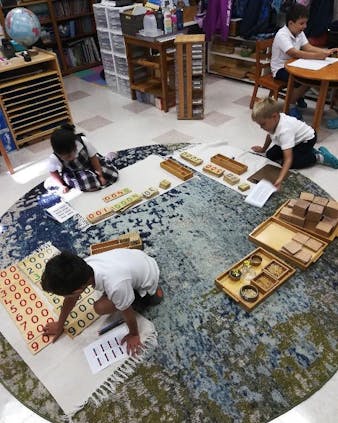Lower Elementary
The Lower Elementary Program

Overview
The Lower Elementary classroom is comprised of students in grades 1-3, ages 6yrs-9yrs old. The age grouping in this program is based on Maria Montessori's second plane of development. The Lower Elementary environment takes into consideration the child's ability to imagine what cannot be seen or what does not exist, the power to reason through to a conclusion, as well as the desire to work with others.
The learning environment is designed for exploration and discovery. Hands on materials allow the children to use manipulatives to see the problems and come to conclusions concretely. This level is a very social stage of development and the students are allowed many opportunities to work collaboratively. Constant exploration of the environment allows for the inherent curiosity to be satisfied.
The day begins at 8:30 AM with a whole group morning meeting, then the children enter their morning work cycle by working independently or partaking in individual or group lessons. A small break is taken for morning snack during this morning work cycle. The children are given a 30 minute lunch and a 30 minute recess time allowing them to freely socialize. The afternoon work cycle consists of silent reading, read aloud activities, cultural lessons, and independent work.
Program Events
Upcoming events to be posted here. Keep an eye out throughout the school year.
Curriculum
What sets Montessori apart in the Elementary years—ages 6 – 12—is the individually paced curriculum that challenges children academically and safeguards their well-being and sense of self. Engaging as contributing members of a respectful community, they learn to question, think critically, and take responsibility for their own learning—skills that will support them in later education and in life.
As at all Montessori levels, the Elementary program is based on the belief that children learn best through movement and work with their hands, and provides cognitive, social, and emotional support to help them reach their full potential.
This includes addressing their needs as they enter a new period of development characterized by a transition from concrete to abstract thinking, growing interest in socialization, thinking and memory that is enhanced by creativity and imagination, and an interest in fairness, social justice, and compassion.
The students are nurtured and grow physically and emotionally while learning traditional academics, including:
- Language Arts
- Math
- Geometry
- Geography
- Science
- History
- Catechesis of the Good Shepherd
- Art
- Music
